- Home
- Edmund White
Our Young Man Page 5
Our Young Man Read online
Page 5
“Well,” Guy said, “I’ve been thinking about my future. I’m thirty-two. Time I had some steady income.”
“You have your Paris apartment rented out.”
“For a pittance. No, tell the baron it’s a yes.”
“He wouldn’t want it to sound like a transaction. He helps his protégé out, and then one night, spontaneously, the protégé explores his dark side in Édouard’s dungeon, just because he wants to.”
“Dungeon?”
“He has a dungeon on West Twenty-sixth Street, two rooms, quite spacious, really, with a Saint Edward’s cross and everything.”
“You’ve been there?”
“Yes. You’ll see—it’s all exciting and effortless.”
“What if I can’t get it up?” Guy wailed.
“That’s of no importance if you’re on the right end of a whip.”
The building was transferred to Guy. He dressed up in his Armani suit and drove in the Mercedes down to the Woolworth Building near Wall Street and visited the very high-end lawyer. There were so many documents to sign, but at the end of it all he was given a copy of the deed. Guy’s own lawyer, a balding bewildered man from the Zoli agency, looked it over and nodded. A nod for which Guy was paying a hundred dollars. But no matter. Pierre-Georges met them there for the signing. He, too, looked very elegant in his boxy Kenzo suit; the lapels were wide and his tie a silk the color of an old bruise. He invited Guy to a Christopher Street restaurant that was calm and empty, next to the Theater de Lys—and, on the other side, to the leather store.
Guy found it very exciting to have Pierre-Georges, the tailor, and a middle-aged clerk watching him as he stripped down in the back of the shop behind a blackout curtain. Guy got an erection from the bright spotlights, the man measuring him, the smell of the leather, the focus and intensity of their stares. He decided not to be embarrassed. The tailor pushed it gently, respectfully, to one side as if it were a familiar though awesome problem. Guy started to say to himself, “Cow-cow, chicken-chicken,” his usual command for going soft, but he stayed hard. Outside on the street, Pierre-Georges, in an unusual gesture of warmth, put an arm around him and said, “You’ll be just fine.”
It wasn’t more than five days later when Édouard phoned him in the afternoon and gave him the address on West Twenty-sixth. He said it wasn’t the main entrance to the building, which was protected by a doorman, but a completely anonymous side door to the right with a buzzer and an intercom. “A woman will answer and you’ll say you’re there for Ed. That’s what they call me: Ed. Tonight at eleven o’clock. I think you’ll find it amusing.”
A fat young woman with a synthetic shiny red nylon-looking pageboy, dressed in black stockings with red garters, a leather miniskirt, a tightly laced bodice from which spilled her large globular breasts, let him in. He did not find her very appetizing. Guy asked if there was a changing room. He had his new leathers in a gym bag. The louvered door in the hallway led to a changing room. “Don’t leave your clothes in there.” Then she said, “Ed’s party is in there,” and pointed to a heavy metal door, the sort Guy imagined was made to contain a fire.
Guy changed rapidly and looked in the mirror to check his hair and outfit. His legs looked skinny and white below the shorts, he feared. But overall he looked frightening—you wouldn’t want to encounter that in a dark alley. He was a long way from Clermont-Ferrand.
He decided not to knock on the metal door and say, “Pardon,” the way he’d been taught but to barge in like Genghis Khan, some big terrifying conqueror. Unfortunately he had his street clothes in the gym bag, which mitigated his sadistic allure.
He walked in and saw four tall men in chaps, asses exposed, standing together with their backs to him, almost as if they were at a urinoir. He put the bag down and drew closer and they were pissing on the baron, who was crouched on his knees, glorying in the rancid urine. He was wearing a strange leather full-length coat, open to expose his chest, belly, and pitiful little erection. The coat was very Wehrmacht. Guy hoped the liquid wouldn’t cause a short in his hearing aids.
Guy knew not to say hello or greet his host. He pulled up beside the man farthest to the left. They seemed to have an inexhaustible supply of urine and they were painting Édouard’s face and chest and belly with the liquid, which wasn’t so yellow. Guy could see a dozen beer cans lined up on the ledge and he imagined that that was what was being recirculated so abundantly.
He was sure he’d be piss-shy, but he tugged his leather shorts down, and out flopped his tumescent dick. Édouard (he tried to think of him as “it,” the piece-of-shit slave, as Pierre-Georges had taught him) crawled over to Guy; he was dripping and barking like a seal. Guy resorted to the usual French banalizing thought: But it’s completely normal, he said to himself, though there was nothing normal about it. Guy was a good enough actor that he felt challenged by this new role. The other folks were muttering the same stupid words, “Yeah, now you’re getting there, yeah, pig, now you’re sucking that big uncut cock, go for it, piggy, yeah, you want that hot young piss, you know you want it …” Guy didn’t dare say anything, with his accent and his ignorance of the right words; he’d be bound to say something like, “Yes, pig, that’s truly excellent,” and they would all laugh, evaporate, like vampires at dawn. He might say something funny. Pierre-Georges had told him humor was the great enemy of sadism. At the sound of the first laugh the whole dungeon would collapse in a puff and vanish.
The baron reached behind him and turned on a faucet that poured water directly onto the raw concrete floor. It flowed into a drain, an industrial-looking drain. No doubt the baron hoped the sound of water would sympathetically induce Guy to pee, but no such luck. He should have gulped three Diet Cokes before coming.
Guy wondered what the scenario was for tonight. Hadn’t Pierre-Georges said the baron liked his orgies to have narratives? It seemed tonight the baron was a bad dog, who kept racing forward to bite his masters on the leg until they whipped him and drove him back into a kennel. The baron actually was uttering, “Gr-r-r,” in an amateurish way that Guy found attachant; at least, mercifully, he was no longer begging for Guy’s piss.
The other men were all of a type—tall, balding, skinny, pale, tattooed, almost as if they were vagrants who slept rough, smelling of old cigarettes and beer, their asses wrinkled and flat like deflated balloons but their dicks big and bridled with shiny cock rings. They all had nascent beards and one man, who looked as if he were in his forties, had a broken tooth. He was the only one wearing a motorcycle jacket and no shirt. His ribs were countable, his stomach flat as a drumhead, his chest stringy with sparse, long hairs.
The bad dog made a rush for Guy’s calf and bit into it. It was painful and released enough adrenaline to power an angry outburst from Guy, who lashed the cur back into its kennel; a second later Guy wondered if he’d actually hurt Édouard and broken the skin, but there was no way to ask.
The dog bite hurt; he could see he was bleeding and he tried to remember if he had any runway dates this week where he had to wear shorts. (He didn’t think so.)
Now that the dog had been sufficiently subdued, all the masters drew a tighter and tighter circle around it and forced it to suck them one after another as dogs will. Then the man with the broken tooth made the dog lie paws-out, faceup on the cement floor. He squatted over it and strained and shit in its mouth. Its mouth was a black hole and it was weeping and chewing. Guy knelt down to Édouard and Guy whispered with concern, “Ça va, Monsieur le Baron?”
2.
“‘Monsieur le Baron’?” Pierre-Georges said angrily.
“How did you know I said that last night?”
“Édouard phoned me. He was very irritated and disabused.”
“I felt sorry for him. I was worried about him.”
“So he said,” Pierre-Georges said acidly. “The scales fell from his eyes and he no longer thinks you’re a real man but some sort of mama’s boy.”
“I knew it was a blunder but I felt
genuine compassion for my friend—”
“A blunder? I’ll say. That’s what he wanted; he’d paid two hundred dollars to each of those types. Since his childhood, he told me he’s dreamed of being disciplined as a bad dog and then forced to eat a turd—un étron.”
“No one has that fantasy. Little boys want to be cowboys or fireman—no one wants to be a bad dog forced to eat shit. Not even a Belgian baron.”
“Chacun à son goût,” Pierre-Georges said philosophically.
“What should I do when I see him the next time?” Guy asked. “How should I act?”
“It’s finished. He won’t bother you again. No more intimate or name-day parties. No more amazing gifts. You might be invited as an extra on a crowded stage if you’re lucky.”
“But we’re friends!” Guy objected.
“Oh, sure. Do you think he invites you because he likes your scintillating conversation about the ups and downs of the rag trade? Do you think he has a burning interest in the rag trade?”
“We have other subjects, serious subjects.”
“I forgot: Your sad childhood. Your Buddhist chants. No, it’s finished.”
Guy thought for a while. “He talked about his sad childhood, too.”
Pierre-Georges snapped, “The only thing sad about his childhood was that he couldn’t convince any of the footmen to shit in his mouth.” Pierre-Georges was warming up to his role as the disabuser. He’d come over to Guy’s for the emergency. He smiled for the first time today. He opened a white paper bag and pulled out a croissant, found a plate in the cupboard, and ate it. As Guy’s manager he of course didn’t offer him anything to eat; Guy’s breakfast was always a cup of black coffee, which he was sipping now while looking sheepish.
After a solitary lunch (a third of a chicken salad at the Front Porch, a neighborhood restaurant where he liked the campy waiter), Guy felt absolved and talked himself into a storm of irritation. He was tired of feeling foolish for a simple act of human kindness. He’d been brought up by a sainted mother. Was it his fault that he couldn’t despise a kind old man, even someone as deeply perverted and depraved as Édouard? Guy imagined most aristocrats were decadent. He was proud of his humble origins. His instincts were still unimpaired. A decade in fashion hadn’t spoiled him. He was still a good person, a simple boy of the people from Clermont-Ferrand and, thank god, not a shit-eating Belgian. He tried to feel sorry for Édouard, for making a mess out of his life.
He decided he’d invite Édouard to dinner. He knew how to cook eel in green sauce, which Édouard loved. And Guy would wear his leather harness and shorts and have menottes, cuff links—no, handcuffs!—dangling on his left side. After a bottle of Gewürztraminer, the baron would end up on his knees begging for it. He’d always been fond of Édouard, who’d been so kind to him, who’d bought him this house, who’d celebrated his name day. He was strange, but then they’d had some good conversations.
But when he phoned Édouard the butler told him once, then twice, that “Monsieur le Baron est sorti”—not at home. He decided to phone at eight A.M. before the butler, who’d never liked him, would have arrived and he’d get the cook, who adored him. But Marguerite for some reason was very cold, too, and told him “Monsieur le Baron est sorti.”
“Ça va, Marguerite?” he asked cheerfully.
“Ça va, Monsieur Guy. Et vous-même?” She’d said tu to him for ages, and Guy felt rebuffed. He said, “I’ll call back,” and she said nothing. He hung up.
A week went by. At last Guy received a creamy envelope embossed with the baron’s coat of arms (two books surrounding a lion and the words MON PLAISIR), inviting him to a large reception honoring the Belgian king’s birthday with the note, “Business attire.” Oh, it would be a straight evening, a champagne reception for dozens of business associates and their wives. No opportunity to flaunt his leathers there!
He made sure he’d look better than everyone else and took a long time with his toilette. His Armani suit, his lace-up Churches, his classic white shirt, and the solid maroon silk tie—and, of course, the emerald. He felt sure the baron would melt when he saw the emerald. It would bring back so many memories.
But the party was a rout, all Belgians (mostly speaking Flemish), toasting the king with American champagne, none of the usual crowd of hot guys, nothing to eat except pretzels (which for some reason the baron thought elegant), several awkward conversations with slow-talking businessmen who wanted to find out how Guy knew the baron and did he work for one of his suppliers, then a sudden general departure at eight engineered by the hateful, tight-lipped butler (the invitation had specified six to eight), and Guy had only caught a glimpse of Édouard, and when he tried to talk to him, the baron had brought forward a fat man in a sports jacket and said, “Oh, good, you two can speak English. Fred, Guy,” and the baron rushed off to kiss an old woman’s hand as she entered the room. Guy waved at Walt, who pretended he didn’t see him.
It turned out this Fred was a very nice man, not a Belgian, not even linked to the baron’s brewery, like all the others, but a film producer from Hollywood who invited Guy out to dinner. They went to Casey’s, a place in the Village, all candles and mirrors, which Guy had walked past a million times but never entered, though it was only four blocks away from where he lived. After the cold douche of the baron’s reception (he hadn’t even said goodbye as Guy was being ushered out in the general stampede), this Fred’s kindness and obvious interest and openness was a balm. Guy felt he’d been slapped in the face and looked at the mirror almost expecting a red hand mark on his cheek, but no, his skin was perfect. Never had Guy been insulted like that, but was the baron, he wondered, freezing him out for his thoughtless kindness? Would he give Guy a second chance? Maybe he was just provoking Guy, hoping to be punished later. (Guy had heard masochists were good at needling their tops.)
At first Guy didn’t say much, nor did he have to. Fred wasn’t exactly a braggart, but he was quick to fill Guy in on his life and work.
“Where are you from?” He’d learned that was the standard question in America, not an impertinence, as it would be in France.
“Oregon.”
“What kind of films do you make?”
“Blaxploitation.”
“Pardon?”
“Movies for black audiences.”
“Oh,” Guy said, losing interest.
“It’s mostly for export. Not something we’d go see, but they love it in Accra.”
“What are they about?”
“Get whitey.”
“Who’s Weddy?”
“Where are you from?”
“Paris.”
“What brings you to these shores?”
“Work. I’m a model.”
“Hands? You have beautiful hands.” Fred smiled.
Guy looked at his hands as if he’d forgotten them. “Oh, really? Do you like my hands?” Did he say hands because he couldn’t think of anything else nice to say? Then he was afraid of thinking like an airhead model and asked, “How do you know Édouard?”
“We have the same taste in boys,” Fred said, lifting his eyebrows significantly.
“You met in some dungeon?”
“Oh, no, I’m a romantic. I like to kiss. I’m looking for a partner.”
“A business partner? For a new African film?” Guy wasn’t paying attention—there were too many mirrors.
“No, a partner in love. A life partner. Someone to share my life with. You see, I just came out.”
“Really? What did you do … before?” The unfamiliarity of the topic made him focus for a minute and to raise his hand to his forehead to block out his own multiplied reflections. He couldn’t concentrate in front of so many mirrors.
“I was married. Three kids. You won’t believe this, but two grandchildren,” and he pulled out his wallet to show their pictures.
Guy didn’t like children but he smiled, not with tenderness at the pictures but out of politeness. “Was it a hard transition?” Guy asked sympathetic
ally. His main course, which Americans for some reason called an entrée, arrived; it was beef Wellington, rare and in a crust that for once wasn’t soggy. He vowed to eat only half of it.
“Coming out?” Fred was tucking into his dish, which was flounder stuffed with crabmeat and shrimp—Guy should have taken that, it would have been lighter. Oh, well, nothing but yogurt for lunch tomorrow. Damn, there was his reflection again. He looked very young in candlelight, he thought, though he usually blew candles out, they hurt his eyes. Like all Frenchmen he preferred a well-lit restaurant and no background music.
“Yes, it was agonizing, but it had to be done.” Fred made it sound like pulling an infected tooth.
Guy realized with a start it was his turn to say something. “Was your wife very hurt?”
“Ceil?” Wasn’t a seal an animal, a phoque? But then Guy realized it must be short for Celia. “Angry? Livid. Ceil had thought for years she must not be desirable, that was why I was shunning her, but when she realized I was gay from the get-go, boy, was she pissed, I’d condemned her to a loveless marriage, ruining the best years of her life.”
“But you gave her children—and grandchildren,” Guy reminded him, “and probably a nice house.”
“A showplace. But she has that famished look of a woman that hasn’t been touched in years—you know the look.”
Guy wasn’t sure he did know the look.
Fred said, “And to come out at sixty-three—okay, sixty-six—is no joke. If you’re a romantic and looking for love.” Fred expected Guy to say something—but what?
Guy pointed out, “There are plenty of other available gay men in their sixties.”
“Nah,” Fred said, and actually shuddered as if he’d seen a ghost. “Older guys have too much emotional baggage. They’ve already lived their lives. I’m only just starting out on mine. I want another youngster, if that makes sense.”

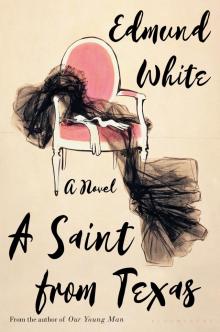 A Saint from Texas
A Saint from Texas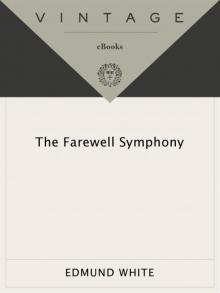 The Farewell Symphony
The Farewell Symphony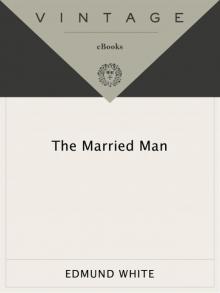 The Married Man
The Married Man A Boy's Own Story
A Boy's Own Story City Boy
City Boy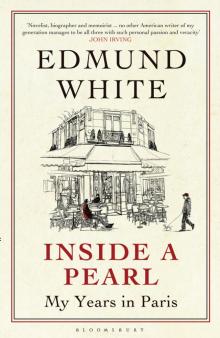 Inside a Pearl
Inside a Pearl Our Young Man
Our Young Man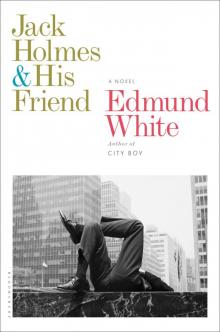 Jack Holmes and His Friend
Jack Holmes and His Friend